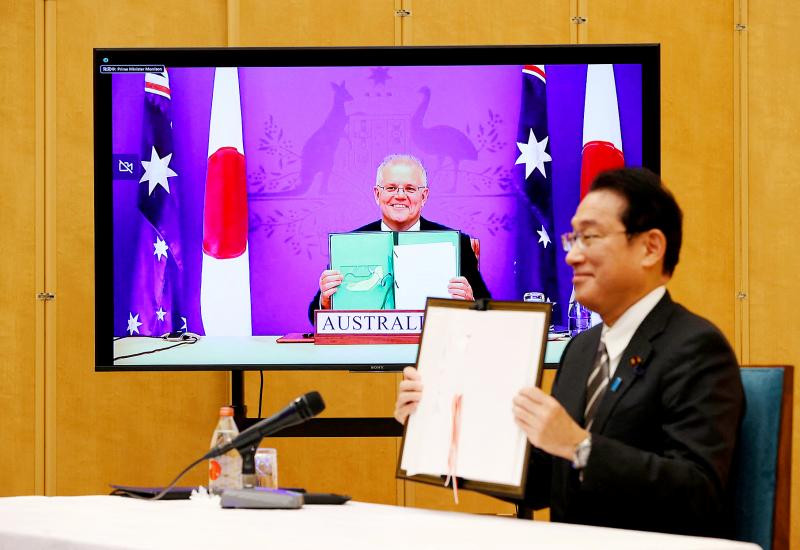Japan and Australia yesterday signed a “landmark” treaty to enhance defense ties, saying the accord would contribute to regional stability, as China expands its military and economic clout.
Although Australian Prime Minister Scott Morrison did not mention Beijing directly in a statement released ahead of the signing, the agreement is seen as another step by the regional allies to signal their concern over China’s military expansion.
Ahead of yesterday’s online summit with Japanese Prime Minister Fumio Kishida, Morrison called the agreement “a statement of two nations’ commitment to work together in meeting the shared strategic security challenges we face and to contribute to a secure and stable Indo-Pacific.”

Photo: AFP
Australia has been working with Japan, India, the UK and the US to strengthen defense ties amid concerns about China, including its pressure on Taiwan, freedom of navigation in the region and trade disputes.
The Reciprocal Access Agreement, Japan’s first with any country, would allow Australian and Japanese militaries to work seamlessly with each other on defense and humanitarian operations, Morrison said.
“Japan is our closest partner in Asia as demonstrated by our special strategic partnership, Australia’s only such partnership — an equal partnership of shared trust between two great democracies committed to the rule of law, human rights, free trade and a free and open Indo-Pacific,” Morrison said.
Kishida called the agreement a “breakthrough” and said ties with Australia would remain a model for security cooperation with other countries, a Japanese Ministry of Foreign Affairs official told a news conference.
When asked about the treaty at a regular briefing on Wednesday, Chinese Ministry of Foreign Affairs spokesman Wang Wenbin (汪文斌) said that “the Pacific Ocean is vast enough for the common development of countries in the region.”
The question of Japan’s security role is likely to figure prominently at “two-plus-two” talks today between the foreign and defense ministers of Japan and the US.
“The ministers are expected to talk about security cooperation in the region,” a Japanese Ministry of Foreign Affairs official told reporters ahead of the talks.
Although Japan maintains a “one China” policy and China is its top export destination, Tokyo’s relationship with Taipei has flourished in the past few years on a largely non-governmental basis, and there has been growing debate among politicians and security experts on whether it should get involved if China was ever to take military action against Taiwan.
Today’s talks could see the US and Japan formalize their work on a draft plan for a joint operation in the event of an emergency over Taiwan, Kyodo news agency reported.
Additional reporting by Reuters

LONG FLIGHT: The jets would be flown by US pilots, with Taiwanese copilots in the two-seat F-16D variant to help familiarize them with the aircraft, the source said The US is expected to fly 10 Lockheed Martin F-16C/D Block 70/72 jets to Taiwan over the coming months to fulfill a long-awaited order of 66 aircraft, a defense official said yesterday. Word that the first batch of the jets would be delivered soon was welcome news to Taiwan, which has become concerned about delays in the delivery of US arms amid rising military tensions with China. Speaking on condition of anonymity, the official said the initial tranche of the nation’s F-16s are rolling off assembly lines in the US and would be flown under their own power to Taiwan by way

OBJECTS AT SEA: Satellites with synthetic-aperture radar could aid in the detection of small Chinese boats attempting to illegally enter Taiwan, the space agency head said Taiwan aims to send the nation’s first low Earth orbit (LEO) satellite into space in 2027, while the first Formosat-8 and Formosat-9 spacecraft are to be launched in October and 2028 respectively, the National Science and Technology Council said yesterday. The council laid out its space development plan in a report reviewed by members of the legislature’s Education and Culture Committee. Six LEO satellites would be produced in the initial phase, with the first one, the B5G-1A, scheduled to be launched in 2027, the council said in the report. Regarding the second satellite, the B5G-1B, the government plans to work with private contractors

‘OF COURSE A COUNTRY’: The president outlined that Taiwan has all the necessary features of a nation, including citizens, land, government and sovereignty President William Lai (賴清德) discussed the meaning of “nation” during a speech in New Taipei City last night, emphasizing that Taiwan is a country as he condemned China’s misinterpretation of UN Resolution 2758. The speech was the first in a series of 10 that Lai is scheduled to give across Taiwan. It is the responsibility of Taiwanese citizens to stand united to defend their national sovereignty, democracy, liberty, way of life and the future of the next generation, Lai said. This is the most important legacy the people of this era could pass on to future generations, he said. Lai went on to discuss

MISSION: The Indo-Pacific region is ‘the priority theater,’ where the task of deterrence extends across the entire region, including Taiwan, the US Pacific Fleet commander said The US Navy’s “mission of deterrence” in the Indo-Pacific theater applies to Taiwan, Pacific Fleet Commander Admiral Stephen Koehler told the South China Sea Conference on Tuesday. The conference, organized by the Center for Strategic and International Studies (CSIS), is an international platform for senior officials and experts from countries with security interests in the region. “The Pacific Fleet’s mission is to deter aggression across the Western Pacific, together with our allies and partners, and to prevail in combat if necessary, Koehler said in the event’s keynote speech. “That mission of deterrence applies regionwide — including the South China Sea and Taiwan,” he